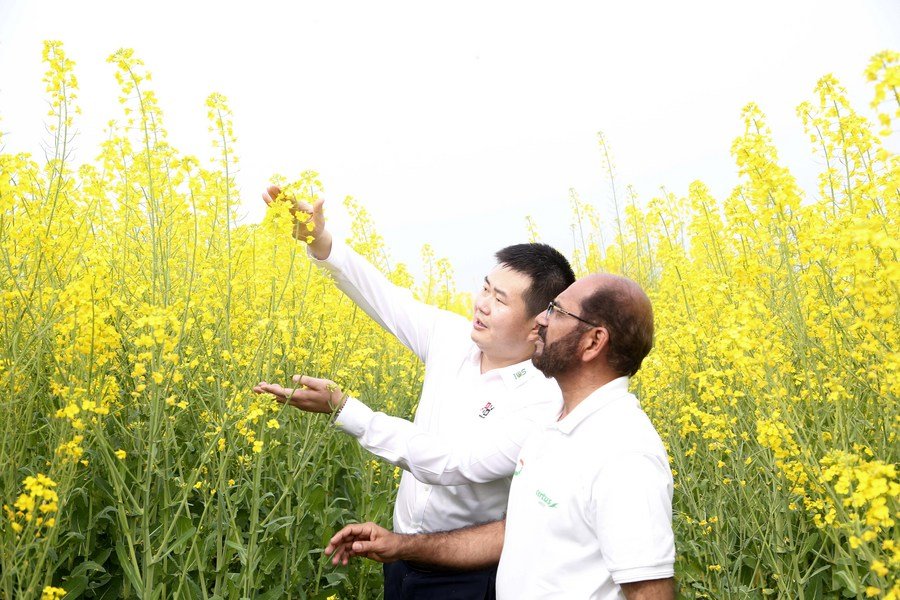China’s Tianjin Modern Vocational Technology College signed an MoU with MNS-University of Agriculture to transfer technology and skill locals in modern farming techniques.

In line with the CPEC agriculture cooperation, China’s Tianjin Modern Vocational Technology College and the MNS-University of Agriculture in Multan signed an MoU to transfer technology to the Pakistani agricultural sector and train locals to use modern farming methods.
Hassan Raza, a farmer in Multan, Pakistan, was amazed by a China-donated corn-cob picker demonstration at MNS-University of Agriculture. The machine helps Pakistan meet climate change challenges by picking whole cobs instead of seeds, allowing farmers to harvest crops earlier than scheduled.
Selective maize grain picking machines, which make Pakistani farmers vulnerable to heat waves and erratic weather patterns, result in crop destruction. The new Chinese picker makes it possible for farmers to gather whole ears of maize and dry them indoors before unfavourable weather develops, protecting the crop and making their work easier.
The China-Pakistan Economic Corridor (CPEC) was launched in 2013 and connects Pakistan’s Gwadar Port with Kashgar in China’s Xinjiang Uygur Autonomous Region. It focuses on energy, transport, and industrial cooperation, with a new phase focusing on agriculture and livelihoods.
China’s Tianjin Modern Vocational Technology College signed an MoU with MNS-University of Agriculture in Multan to transfer technology and skill locals in modern farming techniques.
With the help of Tianjin Modern Vocational Technology College and Punjab Technical Education and Vocational Training Authority, the machine was put together in Luban Workshop Multan after the parts of the Chinese corn cob picker were donated to Pakistan and transferred there under the terms of the MoU.
The machine cost 55,000 US dollars, but Sarfraz Hashim, an agriculture engineer and assistant professor at the MNS-University of Agriculture, told Xinhua that the Chinese university gave it to Pakistan free of charge in order to modernise its agriculture.
“To operate and assemble the machine, our students and engineers underwent a two-week virtual training programme. A few engineers and students will travel to China to learn more about agricultural machinery and farming practises “he added.
After the picker’s demonstration, it will be rented out to farmers at low rates so they can use it to harvest the crop while being watched over by university technicians, according to Hashim.
Farmers were pleased with the demonstration and expressed their admiration for the machine. The professor advised agricultural business experts to import the device and increase its use in other areas, which would sharply increase demand. The machine’s efficiency, which allows it to harvest an acre of corn in an hour, is its best quality.
Hashim stated that China is ahead of Pakistan in mechanization thanks to its advanced technology and much higher yields when discussing the effects of technology transfer by China on Pakistan’s agricultural sector.
He continued, “Under the CPEC agriculture cooperation, it is our fundamental requirement to introduce Chinese machines in Pakistan, which will help Pakistan address the challenges posed by climate change and food security.
MNS-University of Agriculture student Sikandar Raza told Xinhua that he is eager to travel to China to familiarise himself with cutting-edge agricultural methods. I’ll use them to improve the lives of local farmers and advance Pakistan’s agricultural development at home.
China, a leader in agricultural innovation on a global scale, can offer the necessary assistance and knowledge transfer to help Pakistan’s agricultural sector advance, he continued.
According to Raza, Pakistani farmers can increase productivity, decrease crop losses, and ultimately increase profits by adopting modern farming techniques like precision agriculture, hydroponics, and mechanization.